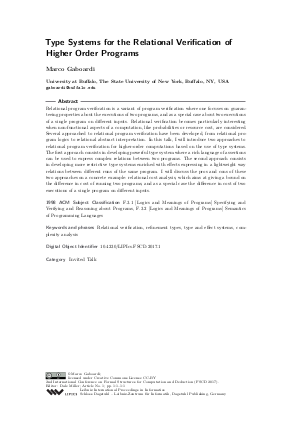Type Systems for the Relational Verification of Higher Order Programs (Invited Talk)
Author Marco Gaboardi
-
Part of:
Volume:
2nd International Conference on Formal Structures for Computation and Deduction (FSCD 2017)
Part of: Series: Leibniz International Proceedings in Informatics (LIPIcs)
Part of: Conference: Formal Structures for Computation and Deduction (FSCD) - License:
 Creative Commons Attribution 3.0 Unported license
Creative Commons Attribution 3.0 Unported license
- Publication Date: 2017-08-30
File

PDF
LIPIcs.FSCD.2017.1.pdf
- Filesize: 200 kB
- 1 pages
Document Identifiers
Subject Classification
Keywords
- Relational verification
- refinement types
- type and effect systems
- complexity analysis
Metrics
- Access Statistics
-
Total Accesses (updated on a weekly basis)
0Document
0Metadata
Abstract
Relational program verification is a variant of program verification where one focuses on guaranteeing properties about the executions of two programs, and as a special case about two executions of a single program on different inputs. Relational verification becomes particularly interesting when non-functional aspects of a computation, like probabilities or resource cost, are considered. Several approached to relational program verification have been developed, from relational program logics to relational abstract interpretation. In this talk, I will introduce two approaches to relational program verification for higher-order computations based on the use of type systems. The first approach consists in developing powerful type system where a rich language of assertions can be used to express complex relations between two programs. The second approach consists in developing more restrictive type systems enriched with effects expressing in a lightweight way relations between different runs of the same program. I will discuss the pros and cons of these two approaches on a concrete example: relational cost analysis, which aims at giving a bound on the difference in cost of running two programs, and as a special case the difference in cost of two executions of a single program on different inputs.
Cite As Get BibTex
Marco Gaboardi. Type Systems for the Relational Verification of Higher Order Programs (Invited Talk). In 2nd International Conference on Formal Structures for Computation and Deduction (FSCD 2017). Leibniz International Proceedings in Informatics (LIPIcs), Volume 84, p. 1:1, Schloss Dagstuhl – Leibniz-Zentrum für Informatik (2017)
https://doi.org/10.4230/LIPIcs.FSCD.2017.1
BibTex
@InProceedings{gaboardi:LIPIcs.FSCD.2017.1,
author = {Gaboardi, Marco},
title = {{Type Systems for the Relational Verification of Higher Order Programs}},
booktitle = {2nd International Conference on Formal Structures for Computation and Deduction (FSCD 2017)},
pages = {1:1--1:1},
series = {Leibniz International Proceedings in Informatics (LIPIcs)},
ISBN = {978-3-95977-047-7},
ISSN = {1868-8969},
year = {2017},
volume = {84},
editor = {Miller, Dale},
publisher = {Schloss Dagstuhl -- Leibniz-Zentrum f{\"u}r Informatik},
address = {Dagstuhl, Germany},
URL = {https://drops.dagstuhl.de/entities/document/10.4230/LIPIcs.FSCD.2017.1},
URN = {urn:nbn:de:0030-drops-77429},
doi = {10.4230/LIPIcs.FSCD.2017.1},
annote = {Keywords: Relational verification, refinement types, type and effect systems, complexity analysis}
}
